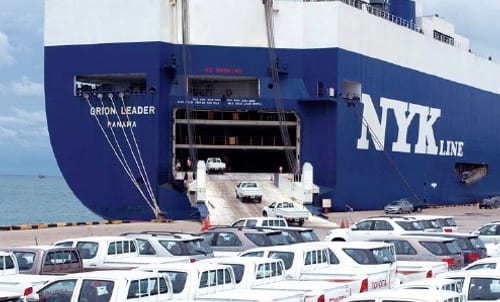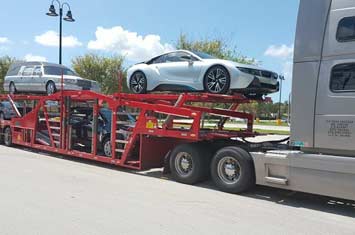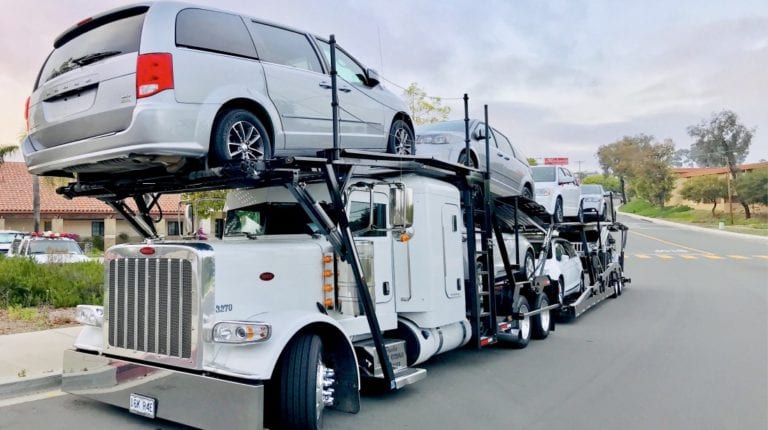If you’re an avid traveler or a camping enthusiast, you know that nothing beats the freedom and adventure of hitting the open road in your trusty RV. But what happens when you want to explore a new destination that’s too far to drive? That’s where RV transportation options come in.
Whether you’re moving to a new home, taking a long-distance trip, or need to transport your RV for repairs, there are a variety of ways to get your home on wheels from point A to point B. In this article, we’ll explore the different options for transporting an RV, so you can choose the one that suits your needs best.
One popular method for RV transportation is hiring a professional transport service. These companies specialize in moving RVs and have the equipment and expertise to handle the job safely and efficiently. They use specialized trailers and trucks designed to accommodate the size and weight of an RV, ensuring that it arrives at its destination in one piece.
Hiring a professional transport service takes the stress and hassle out of moving your RV, allowing you to focus on planning your next adventure.
Another option for RV transportation is towing it yourself. If you have a vehicle that’s capable of towing and feel confident in your driving skills, this can be a cost-effective and convenient solution. However, it’s important to note that towing an RV requires a compatible tow vehicle and the right towing equipment. You’ll also need to familiarize yourself with the laws and regulations regarding towing in your area. It’s crucial to ensure that your tow vehicle is properly equipped and that you have the necessary skills and knowledge to tow your RV safely.
Now that you have an overview of the different options for transporting an RV, you can weigh the pros and cons and choose the method that best suits your needs. Whether you opt for a professional transport service or decide to tow it yourself, the important thing is to ensure the safe and secure transportation of your beloved RV, so you can continue to enjoy the freedom and adventure it brings. So, buckle up and get ready for your next RV journey!
What are the different options for transporting an RV?
eShip Transport Company is a trusted and reliable auto transport company that offers a wide range of transportation options for RVs. Whether you’re moving to a new city or taking a road trip, transporting your RV safely and efficiently is crucial. In this article, we will explore the different options available for transporting an RV and how eShip Transport Company can help you with your RV transportation needs.
1. Open Trailer Transport
One of the most common and cost-effective options for transporting an RV is open trailer transport. With this method, your RV will be loaded onto an open trailer and transported to your desired location. Open trailer transport is suitable for RVs that are weather-resistant and can withstand exposure to the elements. It is important to note that your RV may be exposed to dust, debris, and weather conditions during transportation.
Benefits of open trailer transport include affordability and availability. This option is widely used and readily accessible, making it a convenient choice for many RV owners. However, it is essential to take necessary precautions to protect your RV from potential damage during transportation.
Benefits of Open Trailer Transport:
- Cost-effective option
- Widely accessible and available
- Convenient for many RV owners
Considerations for Open Trailer Transport:
- Possible exposure to weather conditions
- Potential risk of damage from debris
2. Enclosed Trailer Transport
If you are looking for additional protection and security for your RV during transportation, enclosed trailer transport is a suitable option. With this method, your RV will be loaded into an enclosed trailer, providing a shield from the elements and potential road debris. Enclosed trailer transport is ideal for RVs that require extra care and protection.
Enclosed trailer transport offers several benefits, including enhanced security, protection from weather conditions, and reduced risk of damage. This option is often chosen by RV owners who have valuable or delicate RVs that require extra attention during transportation.
Benefits of Enclosed Trailer Transport:
- Enhanced security and protection
- Shielded from weather conditions
- Reduced risk of damage
Considerations for Enclosed Trailer Transport:
- Higher cost compared to open trailer transport
- Availability may be limited
3. Driveaway Service
Another option for transporting an RV is through a driveaway service. With this method, a professional driver will drive your RV to your desired location. Driveaway services are often used when the owner is unable or unwilling to drive the RV themselves.
Driveaway services offer convenience and flexibility, as you don’t have to worry about towing or transporting your RV. However, it is important to choose a reputable driveaway service that provides proper insurance and ensures the safe delivery of your RV.
Benefits of Driveaway Service:
- Convenience and flexibility
- No need for towing or transporting equipment
Considerations for Driveaway Service:
- Dependent on the availability of professional drivers
- Ensure the driveaway service is reputable and insured
4. Towable RVs
If you own a towable RV, such as a travel trailer or a fifth wheel, you have the option to tow it yourself using a suitable vehicle. This gives you complete control over the transportation process and allows you to choose the best route and timing for your journey.
When towing your RV, it is essential to ensure that your vehicle is capable of safely towing the weight of your RV. You may need to invest in additional towing equipment, such as a hitch and brake controller, to ensure a safe and smooth towing experience.
Benefits of Towing Your RV:
- Complete control over the transportation process
- Flexibility in choosing the route and timing
Considerations for Towing Your RV:
- Ensure your vehicle is capable of safely towing the weight of your RV
- Invest in necessary towing equipment
Get FREE RV Transport Quote
(Complete the form below for free reliable RV transport service quote)
Why Choose eShip Transport Company for RV Transport?
When it comes to transporting an RV, eShip Transport Company is the top choice for many RV owners. With their expertise and experience in the auto transport industry, they provide reliable and efficient RV transportation services.
Here are some reasons why you should choose eShip Transport Company for your RV transport needs:
- Professional and insured transport services: eShip Transport Company ensures the safe delivery of your RV through their professional and insured transport services. You can have peace of mind knowing that your RV is in good hands.
- Various transportation options: eShip Transport Company offers a range of transportation options, including open trailer transport, enclosed trailer transport, and driveaway services. You can choose the option that best suits your needs and preferences.
- Platinum Protection Plan: eShip Transport Company provides a Platinum Protection Plan that covers any potential damage to your RV during transport. This added protection gives you extra peace of mind.
- Excellent customer service: eShip Transport Company has a dedicated customer service team that provides personalized assistance throughout the transportation process. They are available to answer any questions or concerns you may have.
- Positive reputation: eShip Transport Company is highly rated and recognized as one of the top car shipping companies in America. They have established trust, quality, and value in the transport industry.
Transporting an RV can be a complex process, but with eShip Transport Company, you can trust that your RV will be transported safely and efficiently. Take immediate action and discover the reliable and professional RV transport services provided by eShip Transport Company. Choose eShip Transport Company as your RV transport service and experience a hassle-free transportation process.
Key Takeaways: What are the different options for transporting an RV?
- RV owners can choose to tow their RV using a vehicle specifically designed for towing.
- Another option is to hire a professional RV transport service to handle the transportation.
- RV owners can also opt for flatbed transport, where the RV is loaded onto a flatbed truck.
- Some RVs are small enough to be transported on a trailer, which can be pulled by a regular vehicle.
- If the RV needs to be transported overseas, it can be shipped via a cargo ship.
Frequently Asked Questions
1. How can I transport my RV?
Transporting an RV can be done through various methods depending on your preferences and needs. Here are some different options for transporting an RV:
Firstly, you can choose to tow your RV using a suitable vehicle. This method is commonly used for smaller RVs or travel trailers. Make sure your towing vehicle is equipped with the necessary towing capacity and hitch system. Additionally, consider the weight restrictions and legal requirements for towing in your area.
Secondly, you may opt for professional RV transport services. These companies specialize in moving RVs long distances and have the expertise and equipment to ensure a safe and secure transport. They typically use specialized trailers designed specifically for RVs, ensuring proper support and protection during transit.
Lastly, if you prefer to avoid towing or hiring a transport service, you can explore the option of driving your RV to your desired location. This gives you the flexibility to enjoy the journey and make stops along the way. However, it requires careful planning, as you need to consider factors such as fuel efficiency, driving routes suitable for larger vehicles, and finding suitable campsites for overnight stays.
2. What are the advantages of hiring a professional RV transport service?
Hiring a professional RV transport service offers several advantages. Firstly, these companies have the necessary experience and expertise in handling RVs, ensuring they are moved safely and securely. They have specialized equipment and trailers designed specifically for RV transport, reducing the risk of damage during transit.
Secondly, professional transport services can save you time and effort. They take care of all the logistics, including route planning, permits, and insurance, allowing you to focus on other aspects of your move. This can be especially beneficial if you are moving long distances or across state lines.
Additionally, using a professional transport service eliminates the need for you to have a suitable towing vehicle or to navigate unfamiliar roads while towing a large RV. This can provide peace of mind and reduce the stress associated with DIY transportation.
Lastly, professional transport services often provide insurance coverage for your RV during transit. This adds an extra layer of protection and gives you peace of mind knowing that your RV is covered in case of any unforeseen incidents.
Overall, hiring a professional RV transport service can provide convenience, safety, and peace of mind, making it a popular choice for many RV owners.
3. Can I tow my RV with any vehicle?
Towing an RV requires a vehicle with sufficient towing capacity and the appropriate hitch system. Not all vehicles are suitable for towing, especially larger RVs or travel trailers.
To determine if your vehicle can tow an RV, you need to consider its towing capacity. This information can usually be found in the vehicle’s owner’s manual or by contacting the manufacturer. The towing capacity indicates the maximum weight that the vehicle can safely tow.
In addition to towing capacity, you also need to ensure that your vehicle is equipped with the proper hitch system. This includes a receiver hitch, ball mount, and trailer hitch ball. The hitch system should be compatible with the RV’s coupler or hitch receiver.
It is important to note that towing an RV places additional strain on the towing vehicle, affecting its performance and fuel efficiency. Therefore, it is essential to choose a vehicle that is specifically designed for towing or has the necessary modifications to handle the extra load.
4. What factors should I consider when driving my RV to a new location?
Driving your RV to a new location requires careful planning and consideration of several factors. Here are some key factors to keep in mind:
Firstly, consider the driving routes suitable for larger vehicles. Some roads may have height or weight restrictions that could limit your RV’s access. Plan your route in advance, ensuring it is RV-friendly and avoids any potential obstacles or challenges.
Secondly, fuel efficiency is an important consideration when driving an RV. Larger and heavier RVs tend to consume more fuel compared to smaller vehicles. Plan your fuel stops accordingly and be prepared for higher fuel costs during your journey.
Thirdly, find suitable campsites or RV parks for overnight stays. Research and book campsites in advance to ensure availability, especially during peak seasons. Consider amenities, such as water and electrical hookups, dump stations, and proximity to attractions or services.
Lastly, familiarize yourself with any local driving laws or regulations that may differ from your home state or country. This includes speed limits, parking restrictions, and any specific rules for RVs.
By considering these factors and planning your route carefully, you can make your RV journey safe, enjoyable, and stress-free.
5. Are there any weight restrictions when towing an RV?
Yes, there are weight restrictions when towing an RV. These restrictions are in place to ensure the safety of both the towing vehicle and other road users.
The weight restrictions typically refer to the Gross Vehicle Weight Rating (GVWR) and the Gross Combined Weight Rating (GCWR) of the towing vehicle. The GVWR is the maximum weight that the vehicle can safely carry, including passengers, cargo, and the tongue weight of the trailer. The GCWR, on the other hand, is the maximum combined weight of the towing vehicle and the trailer.
Exceeding the weight limits can put excessive strain on the towing vehicle, leading to reduced braking and handling capabilities. It can also increase the risk of accidents and damage to the vehicle’s components.
To determine the weight restrictions for your towing vehicle, refer to the owner’s manual or contact the manufacturer. It is important to know the towing capacity and ensure that your RV’s weight is within the allowed limits.
Additionally, it is crucial to distribute the weight properly within the RV and ensure that the trailer is properly balanced. This helps maintain stability during towing and reduces the risk of sway or fishtailing.
Always adhere to the weight restrictions and ensure safe towing practices to protect yourself, your passengers, and other road users.
Final Summary: Exploring Your Options for Transporting an RV
So, you’ve got an RV and you’re ready to hit the road, but how do you actually get it from point A to point B? Luckily, there are several different options for transporting your beloved home-on-wheels. Let’s take a closer look at these options and find the one that suits your needs best.
One popular choice is hiring a professional RV transport service. These companies have the expertise and equipment to safely move your RV to its destination. Whether you’re moving across the country or just a few hundred miles away, they can handle the job with ease. Just make sure to do your research and find a reputable company that offers competitive prices and excellent customer reviews.
If you prefer to take matters into your own hands, you can always consider towing your RV yourself. This option allows you to have more control over the transportation process and gives you the freedom to set your own schedule.
However, it’s important to note that towing an RV requires a vehicle with the appropriate towing capacity and the right equipment, such as a hitch and brake controller. Additionally, you’ll need to familiarize yourself with the towing laws and regulations in your area to ensure a safe and legal journey.
Another option to consider is renting a vehicle specifically designed for RV transport. These specialized vehicles, known as RV transporters or haulers, are built to securely carry your RV to its destination. Renting a transporter eliminates the need for you to worry about the logistics of towing and allows you to focus on enjoying the journey. Just like with any rental service, be sure to read the terms and conditions carefully and choose a reliable company.
In conclusion, when it comes to transporting your RV, you have several options to choose from. Whether you decide to hire a professional transport service, tow it yourself, or rent an RV transporter, each option has its own advantages and considerations. Ultimately, the choice depends on your preferences, budget, and the distance you need to travel. So, weigh your options, plan your route, and get ready to embark on your next RV adventure!








